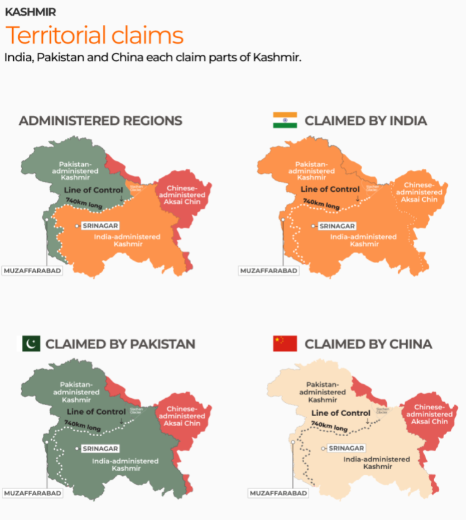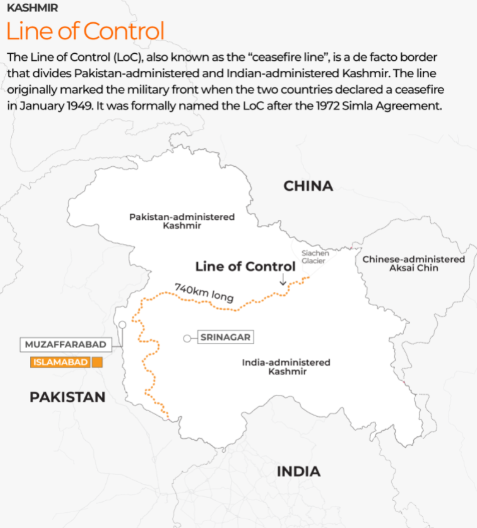Islamabad, Pakistan – Tensions between India and Pakistan have sharply elevated following the April 22 assault on vacationers within the scenic city of Pahalgam, situated in Indian-administered Kashmir, which resulted within the deaths of a minimum of 26 folks.
Within the aftermath, India held a cupboard assembly chaired by Prime Minister Narendra Modi and introduced a number of vital measures. These embrace suspending the decades-old Indus Waters Treaty, which manages the shared use of the Indus River system, and performs an important function for each international locations. India additionally declared the closure of its border with Pakistan, halted bilateral commerce, revoked visas, and decreased the variety of Pakistani diplomats stationed within the nation.
In retaliation, Pakistan’s Nationwide Safety Committee (NSC), the nation’s high physique for civil and navy management, issued reciprocal steps. These embrace closing its borders and airspace to India, halting commerce, and, notably, threatening to withdraw from all bilateral agreements with India, together with the historic Simla Settlement.
Established in 1972, the Simla Settlement serves as a foundational framework for managing relations between India and Pakistan, notably in regard to the Line of Management and the peaceable decision of disputes.
Pakistan’s potential withdrawal from the settlement alerts a significant escalation in tensions. This raises crucial questions concerning the nature of the Simla Settlement and the implications of its doable suspension.
What’s the Simla Settlement?
Seven months after the 1971 struggle, which resulted in India’s victory and the formation of Bangladesh, Pakistani President Zulfikar Ali Bhutto and Indian Prime Minister Indira Gandhi met in Shimla, the capital of the Indian state of Himachal Pradesh, to revive regular relations between the 2 nations.
The settlement, signed on July 2, 1972, emphasised the peaceable decision of disputes, together with the Kashmir problem, via bilateral discussions.
It additionally highlighted mutual respect for every nation’s territorial sovereignty, political independence, and the precept of noninterference in inside affairs.
A big consequence of the settlement was the renaming of the Ceasefire Line—the de facto border—between the 2 nations because the Line of Management (LoC), with either side pledging to not alter it unilaterally.
Moreover, the settlement facilitated the discharge of over 90,000 Pakistani prisoners of struggle held by India after the battle.
The settlement additionally said that, till a closing decision of any excellent points is reached, neither facet would take unilateral actions that would disrupt peace, and each would chorus from supporting or encouraging any actions dangerous to peaceable relations.

Significance of Pakistan’s menace:
Ahmer Bilal Soofi, an knowledgeable in worldwide regulation and former authorized adviser to the Pakistani authorities, described the Simla Settlement as a short lived however very important framework governing relations between Pakistan and India. He famous that any transfer to droop the settlement would require an intensive inside overview by Pakistan to make sure it aligns with the nation’s strategic pursuits. In response to him, such a step calls for cautious and complete consideration.
One other authorized scholar, Muhammad Mushtaq Ahmad from Shifa Tameer-e-Millat College, identified that India has persistently considered the Simla Settlement as overriding earlier United Nations Safety Council resolutions. He defined that India sees the Kashmir problem as a bilateral matter, leaving no room for worldwide mediation.
The Kashmir area has remained a significant supply of battle between the 2 international locations since their independence in 1947. Each nations management components of the territory however declare it in its entirety. Over time, they’ve fought 4 wars, three of which have been instantly associated to Kashmir.
Pakistan, nonetheless, interprets the Simla Settlement as reinforcing the necessity for a peaceable, diplomatic resolution in keeping with worldwide resolutions. After India revoked the particular standing of Jammu and Kashmir in 2019, Pakistan accused India of violating the settlement, probably giving Pakistan grounds to rethink its dedication to it.
Ahmad urged that Pakistan may invoke the Vienna Conference on the Legislation of Treaties, which it has ratified, to justify such a transfer. The conference permits a signatory to withdraw from a treaty if there was a big breach, though India just isn’t a celebration to the conference.
Indian defence analyst Ajai Shukla warned that if both facet abandons the settlement, it may result in instability alongside the Line of Management (LoC). And not using a binding treaty, either side would possibly be at liberty to change the established order, probably escalating tensions and rising the probability of armed battle.
Does Suspending the Simla Settlement Sign a Transfer Towards Conflict?
Regardless of the existence of the Simla Settlement, India and Pakistan have continued to interact in navy confrontations, together with the extended battle over the Siachen Glacier — referred to as the very best battlefield on the planet — and the 1999 Kargil battle. In response to educational Muhammad Mushtaq Ahmad, the Line of Management (LoC) has by no means really been efficient in securing lasting peace between the 2 nations.

Pakistani constitutional knowledgeable Rida Hosain has said that India has traditionally taken benefit of the Simla Settlement to serve its personal pursuits. She emphasised that whereas the core precept of the settlement is peaceable coexistence, latest aggressive rhetoric and unsubstantiated accusations from India contradict that spirit. Her feedback referred to India’s declare that Pakistan was behind the Pahalgam assault, a cost Islamabad has denied whereas urging India to current proof and calling for an neutral investigation into the incident.
In the meantime, Indian defence analyst Ajai Shukla, a former military officer, remarked that if Pakistan have been to withdraw from the Simla Settlement, it might not mechanically set off a struggle. Nevertheless, he cautioned that such a transfer would take away a key authorized framework restraining each international locations, rising the danger of escalation and bringing them nearer to open navy confrontation.
Understanding Pakistan’s Rationale:
Not like its swift motion on different retaliatory steps, Pakistan has to this point solely issued warnings about withdrawing from the Simla Settlement quite than taking concrete steps to take action.
Authorized knowledgeable Ahmer Bilal Soofi defined that Pakistan’s hesitation is tied to its broader intention of re-engaging with worldwide mechanisms. He famous that India has persistently argued the Kashmir dispute is a bilateral matter primarily based on the Simla Settlement. By suspending the settlement, Pakistan may reopen the door to worldwide involvement within the problem.
Defence analyst Ajai Shukla identified that ending the settlement may give each international locations extra flexibility to claim their positions alongside the Line of Management (LoC), one thing not doable whereas the settlement stays in power. He added that Pakistan has usually considered the settlement as a limitation, notably in areas like Siachen, the place it accuses India of violating the pact. In 1984, India took management of the Siachen Glacier in a navy operation that Pakistan has lengthy claimed breached the phrases of the settlement.
India, too, feels constrained by the settlement, in keeping with Shukla. New Delhi continues to assert Pakistan-administered Kashmir as its personal, and beneath the present authorities, calls to reclaim it via navy means have intensified.
Shukla concluded that each nations more and more imagine the settlement now not serves their nationwide pursuits.
In the meantime, authorized scholar Muhammad Mushtaq Ahmad argued that India’s latest actions associated to the Indus Waters Treaty may already be considered as aggressive beneath worldwide regulation, probably justifying defensive responses from Pakistan. The treaty divides river utilization between the 2 international locations, with India receiving waters from some rivers and Pakistan from others. Ahmad emphasised that the disruption of this water sharing impacts hundreds of thousands of lives in Pakistan and may very well be thought-about a hostile transfer.
He added that Pakistan’s warning to exit the Simla Settlement was a calculated step by its authorities, meant to function a severe reminder to India.
For extra present occasions, go to share4all.cc or gag4all.com




















 Animals
Animals
5 Comments